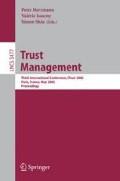Abstract
In this paper we propose a method that can be used to avoid the problem of sparsity in recommendation systems and thus to provide improved quality recommendations. The concept is based on the idea of using trust relationships to support the prediction of user preferences. We present the method as used in a centralized environment; we discuss its efficiency and compare its performance with other existing approaches. Finally we give a brief outline of the potential application of this approach to a decentralized environment.
Access this chapter
Tax calculation will be finalised at checkout
Purchases are for personal use only
Preview
Unable to display preview. Download preview PDF.
References
Christianson, B., Harbison, W.S.: Why isn’t Trust Transitive? In: Proc. of the Security Protocols Workshop, p. 171; Resnick, P., Varian, H.R.: Recommender Systems. Communications of the ACM 40(3), 56–58 (1997)
Resnick, P., Iacovou, N., Suchak, M., Bergstrom, P., Riedl, J.: Grouplens. An Open Architecture for Collaborative filtering of Netnews. In: Proceedings of ACM 1994, Conf. on Computer Supported Cooperative Work (1994)
Breese, J.S., Heckerman, D., Kadie, C.: Emperical Analysis of Predictive Algorithms for Collaborative Filtering. In: Proc. of the 14th Conference on Uncertainty in Artificial Intelligence, pp. 43–52 (1998)
Maltz, D., Ehrlish, K.: Pointing the Way: Active Collabortive filtering. In: Proc. of CHI 1995 (1995)
Marsh, S.: Formalizing Trust as Computational concept. PhD Thesis, University of Stirling, Scotland (1994)
Yahalom, R., Klein, B., Beth, T.: Trust relationships in secure systems – A Distributed authentication perspective. In: Proc. of the 1993 IEEE Symposium on Research in Security and Privacy, Denver,Colorado, pp. 152, 202–209 (1995)
Cristianson, B.: Harbison, p. 176 (1996)
Jøsang, A., Gray, E., Kinateder, M.: Analyzing topologies of Transitive Trust. In: Proceedings of the Workshop of Formal Aspects of Security and Trust (FAST 2003), Piza (September 2003)
Shafer, G.: A Mathematical Theory of Evidence. Princeton University Press, Princeton (1976)
Jøsang, A.: A Logic for Uncertain probabilities. International Journal of Uncertainty, fuzziness and Knowledge based systems 9(3) (June 2001)
Jøsang, A.: An Algebra for Assessing Trust in Certification Chains. In: Proceedings of NDSS 1999, Network and Distributed Systems Security Symposioum. The Internet Society, San Diego (1999)
Pitsilis, G., Marshall, L.: A model of Trust Derivation from Evidence for User in recommendation Systems, CS-TR-874, Technical Report Series, School of Computing Science, University of Newcastle (November 2004)
Aggarwal, C.C., Wolf, J.L., Wu, K., Yu, P.S.: Horting Hatches an Egg: A New Graph-theoretic Approach to Collaborative Filtering. In: Proceedings of the ACM KDD 1999 Conference, San Diego, CA, pp. 201–212 (1999)
Massa, P., Avesani, P.: Trust-aware Collaborative Filtering for recommender Systems. In: Meersman, R., Tari, Z. (eds.) OTM 2004. LNCS, vol. 3290, pp. 492–508. Springer, Heidelberg (2004)
Rahman, A., Heiles, S.: Supporting trust in Virtual Communities. In: Proceedings of International conference on System Sciences, Hawaii, January 4-7 (2000)
Miller, B.N., Albert, I., Lam, S.K., Konstan, J.A., Riedl, J.: MovieLens Unplugged: Experiences with an Occasionally Connected Recommender System. In: Proceedings of ACM 2003 International Conference on Intelligent User Interfaces (IUI 2003) (January 2003) (Accepted Poster)
Sarwar, B.M., Karypis, G., Konstan, J.A., Riedl, J.T.: Application of Dimensionality Reduction in Recommender System-A Case Study. In: WebKDD Workshop, August 20 (2000)
Author information
Authors and Affiliations
Editor information
Editors and Affiliations
Rights and permissions
Copyright information
© 2005 Springer-Verlag Berlin Heidelberg
About this paper
Cite this paper
Pitsilis, G., Marshall, L. (2005). Trust as a Key to Improving Recommendation Systems. In: Herrmann, P., Issarny, V., Shiu, S. (eds) Trust Management. iTrust 2005. Lecture Notes in Computer Science, vol 3477. Springer, Berlin, Heidelberg. https://doi.org/10.1007/11429760_15
Download citation
DOI: https://doi.org/10.1007/11429760_15
Publisher Name: Springer, Berlin, Heidelberg
Print ISBN: 978-3-540-26042-4
Online ISBN: 978-3-540-32040-1
eBook Packages: Computer ScienceComputer Science (R0)

